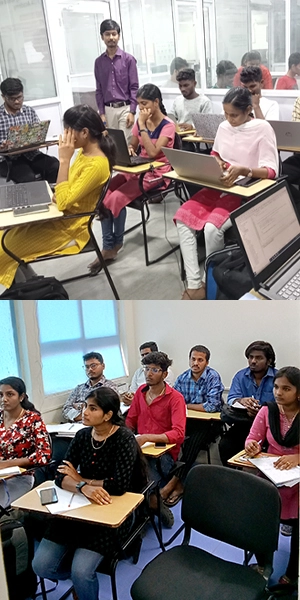Course Highlights and Why Software Testing Course in Chennai at FITA Academy?
Upcoming Batches
- 29-12-2025
- Weekdays
- Monday (Monday - Friday)
- 01-01-2026
- Weekdays
- Thursday (Monday - Friday)
- 03-01-2026
- Weekend
- Saturday (Saturday - Sunday)
- 05-01-2026
- Weekdays
- Monday (Monday - Friday)
Classroom Training
- Get trained by Industry Experts via Classroom Training at any of the FITA Academy branches near you
- Why Wait? Jump Start your Career by taking the Software Testing Training in Chennai!
Instructor-Led Live Online Training
- Take-up Instructor-led Live Online Training. Get the Recorded Videos of each session.
- Travelling is a Constraint? Jump Start your Career by taking the Software Testing Online Course!
Software Testing Course Objectives
- It is essential to understand various software development lifecycle models, including the Waterfall, V-model, Incremental, RAD, Agile, Iterative, and Spiral Models, to support testing effectively.
- Understand the significance of testing in SDLC concepts and the differences between verification and validation.
- Learn all the essential techniques for testing desktop, web, and mobile applications, including their specifics and methods.
- Develop the ability to formulate a comprehensive test strategy and plan for real-world projects, including creating essential documents like the test plan and clarification document.
- Learn test design techniques, such as boundary value analysis, equivalence partitioning, decision table testing, state transition diagrams, use case testing, and code coverage methodologies (statement, branch, path, and LCSAJ).
- Gain practical experience executing test cases, reporting test results, and managing defects throughout their lifecycle.
- Comprehend the price implications of software quality and review guidelines for classifying defects as critical, important, moderate, or low.
- Gain practical exposure to defect management tools like Bugzilla and become proficient in tracking and documenting defects as well as in defect resolution.
- Understand the static and dynamic testing methods, which include white-box and black-box testing approaches, to ensure efficient and practical testing.
- Transition into Automation Testing with comprehensive coverage of feasibility analysis, test environment setup, script generation, execution, and integration, with a strong focus on industry-leading tools like Selenium and its frameworks.
Syllabus
Manual Testing Course Syllabus - Software Lifecycle Models
- Waterfall model
- V model
- Incremental model
- RAD model
- Agile model
- Iterative model
- Spiral model
Software Testing Course Trainer Profile
- The trainers of software testing coaching in Chennai possess various roles in the testing domain, including testing managers, automation engineers, and more.
- Trainers provide students with the ideal blend of theoretical and practical learning experiences, complemented by the latest tools and technologies.
- Since our trainers are experienced industry professionals, they bring industry-relevant skills.
- Regular doubt-clearing and recap sessions ensure students thoroughly understand the concepts taught.
- We have a dedicated placement cell to provide 100% job support through mock interviews, group discussions, practice tests on software testing interview questions and answers, and guidance on resume building.
Learn at FITA Academy & Get Your
Dream IT Job in 60 Days
like these Successful Students!
Student Success Story of Software Testing Course in Chennai
Keerthana is a B.Tech IT student who stays in Kundrathur. She was brought up in an orphanage. Despite this, she could not secure a decent-paying job after completing her studies. Since she had no one to provide her with some funds, she hardly managed to make a living. This is despite her doing odd jobs after her working hours. That was when her college professor suggested joining FITA Academy, considering his daughter, too, joined the same institution.
Keerthana already knew Java. Based on that, our coordinators suggested several courses, of which she chose Software Testing. She took up the course and attended classes in the evenings after her job hours. She gained a comprehensive knowledge of the various aspects of Software Testing due to our efficient teaching staff and dedication from her end. She completed the course along with the capstone project and obtained the certificate of completion.
Keerthana attended placement training provided by FITA Academy after the Software Testing Classes in Chennai. Because of that, she was able to improve upon her earlier failures in job seeking. After months of endless job searches, she finally managed to get offers from BMSmartware and ApproLabs Pvt Ltd. She accepted the offer from ApproLabs Pvt Ltd and is now working as a QA Tester with a salary of 4 LPA.
Key Features
FITA Academy empowers individuals with industry-relevant skills through expert-led training, transforming careers with hands-on experience.

Expert Trainers
Learn from industry professionals with hands-on experience.

Real-Time Projects
Gain practical exposure by working on live projects.

Certification
Get certified from FITA Academy and become job-ready.

Affordable Fees
High-quality courses available at a low budget.

Flexible Learning
Choose online/classroom, timings, and learning pace.

Placement Support
Access 3000+ companies for career opportunities.
Why Learn Software Testing Course in Chennai at FITA Academy?
Live Capstone Projects
Real time Industry Experts as Trainers
Placement Support till you get your Dream Job offer!
Free Interview Clearing Workshops
Free Resume Preparation & Aptitude Workshops
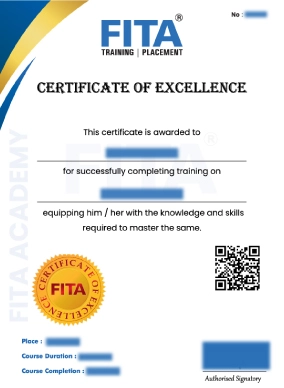
Software Testing Certification Training in Chennai
A software testing course in Chennai with certificate is provided once the students complete the testing courses. The certificate demonstrates the level of expertise a candidate has gained in software testing and its application. Presenting your resume along with this certificate would significantly enhance your profile. During interviews, it would grab recruiters’ attention and provide access to a multitude of job options.
Focus on acquiring the skill sets required for a professional software tester with the assistance of our well-seasoned professionals. In addition to teaching the fundamentals of automation, our Automation Testing Course in Chennai at FITA Academy improves these abilities. The certificate awarded upon completion of the course provides proof of the knowledge gained.
Apart from the certificate, we cover the syllabus required for all major international certifications. These include the International Software Testing Qualifications Board (ISTQB), the International Software Certification Body (ISCB), the Quality Assurance Institute (QAI), and many others. Some of these certifications include:
International Software Testing Qualifications Board
- Core Foundation – Certified Tester Foundation Level
- Core Advanced – Test Analyst
- Core Advanced – Test Manager
- Core Advanced – Technical Test Manager
- Specialist – AI Testing
- Specialist – Game Testing
- Specialist – Performance Testing
- Specialist – Test Automation Engineer
- Specialist – Automotive Software Tester
- Specialist – Usability Testing
- Specialist – Acceptance Testing
- Specialist – Gambling Industry Tester
- Specialist – Mobile Application Testing
- Specialist – Security Tester
- Specialist – Model-Based Tester
- Agile Tester
- Agile Test Leadership at Scale
- Agile Technical Tester
- Expert Level – Assessing Test Processes
- Expert Level – Implementing Test Process Improvement
- Expert Level – Strategic Test Management
- Expert Level – Operational Test Management
- Expert Level – Managing the Test Team
International Software Certification Board (ISCB)
- Certified Manager of Software Testing (CMST)
- Certified Associate in Software Testing (CAST)
Quality Assurance Institute (QAI)
- Certified Test Engineer (CSTE).
- Certified Software Quality Analyst (CSQA).
As FITA Academy’s software testing coaching in Chennai provides comprehensive training which covers all the crucial concepts, taking this course is a wise choice if you also plan for Python training and any other certification exams.
Have Queries?
Talk to our Career Counselor for more Guidance on picking the right Career for you!
Placement Session & Job Opportunities
After completing Software Testing Course in Chennai
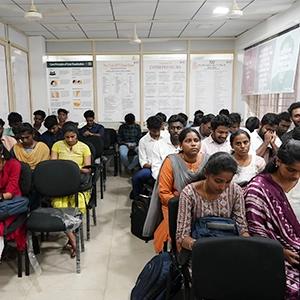


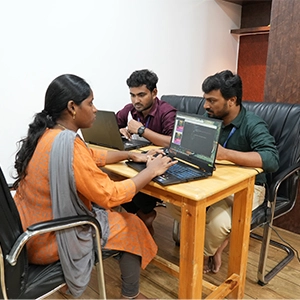
Software Testing is one of the booming industry sectors right now, as claimed by the reports submitted by NASSCOM. The overall market value of software testing services is expected to reach $50 billion over the next 3 years, marking a new all-time high in the industry.
There has been an increase in prospects for software testers in India due to growing reliance on and advancement in technology, new and improved testing policies, tests, and demands for professional testers worldwide. Software tester salary for freshers earns up to INR 2.5 lacs per annum. Any other job position requires the candidate to have more than one year of experience.
The most reputable companies that hire testers are HCL, Oracle, IBM, Accenture, Infosys, Cognizant, TCS, Autodesk, Red Hat, and the Bank of America, etc. These companies offer job titles, including Quality Analyst Trainees, Quality Analyst Testers, Software Engineer Testers, and Senior Quality Analysts, as well as job titles such as Test Managers, Automation Testers, and Senior Test Managers. With that being said, FITA Academy has been offering some of the best software testing classes in Chennai for budding testers through the software testing course in Chennai with placement assistance. It helps students capitalise on the growing opportunities in the job market.
“We offer 100% placement assistance by the end of the course.”
Some of the common job roles associated with software testing are as follows:
Manual Testing Engineer
Manual testers are essential for software quality assurance. They develop test strategies and plan for troubleshooting to ensure applications function correctly. Their tasks involve understanding project needs, analyzing specifications, documenting findings, and reporting progress to stakeholders. By designing test cases and maintaining effective communication with development teams, manual testers play a crucial role in delivering reliable software.Manual Testing may also design and build test structures, keep records, and write progress reports. Furthermore, a manual tester must maintain an active line of communication with personnel to ensure a smooth and efficient process. Our Software Testing Tutorial will be helpful to those seeking a career in the software Testing domain.
Test Analyst
A software test analyst is expected to perform several tests to deliver quality software to the market. The role of a software test analyst primarily encompasses coming up with tests, that is, planning and conducting tests. Additionally, you need to determine whether the desired test case is suitable for the product and ensure that the tests run as intended according to the arrangements made.
As we already know, software testing usually implies many different responsibilities. With software testing classes in Chennai, FITA Academy has trained several Test analysts.
QA Lead
The QA lead helps maintain the software’s quality and ensures it works properly before it is released. They must perform numerous tests to ensure the software fulfils the needs and customer expectations. Such a process involves reviewing test outcomes, identifying problems, and providing detailed reports to developers.
The QA lead of software has a role beyond regular testing, they must confirm that there are no defects in the software and that it will function as intended in various environments. For QA leads to succeed in such a constantly changing technological environment, they need to stay updated with the latest trends in testing tools, models, and other relevant areas. Practical training is also necessary to develop and apply skills in response to new issues: Technological literacy is dynamic and situated within an ever-evolving context. These facets of technological literacy require continuous learning and integration of practical experience. Software Testing Training in Chennai provides an introduction to new generation testing tools and techniques, including Selenium tools, along with various best practices that QA professionals can follow to produce more efficient software products.
Test Manager
Test Manager is a key position in the software testing organization. A Test Manager is responsible for maintaining the test environment, conducting tests, and managing the results. They should have a good understanding of test management tools and be able to work with other team members to achieve results.
A Test Manager is responsible for the day-to-day operations of a software testing environment. They manage testing resources, client and server applications, and test reports. Test managers also provide leadership and direction to the team during testing events. For individuals aspiring to take up a leadership role in software testing and JavaScript, completing software testing classes in Chennai provides in-depth knowledge.
Software Test Architect
A software test architect has many roles and responsibilities. One of the most important responsibilities of a software test architect is to design, implement, and maintain software test frameworks and tools. They must also be familiar with the software development process and unit testing tools.
In today’s competitive job market, the demand for skilled software testers is relatively high, as ensuring robust quality is paramount for delivering reliable software products. To excel in this vital field, a strong foundation in diverse software testing methods and hands-on experience with various testing tools is essential. To excel in this role, a strong foundation in software testing methods and experience with various testing tools are essential. After completing a comprehensive Software Testing Course in Chennai at FITA Academy, individuals gain the expertise to manage and operate a complex software testing environment effectively, ensuring the delivery of high-quality software products.
Mallika Arjun
I was jobless for 3 years after completing my degree. This is due to a lack of skillset. One of my friends then suggested I join FITA Academy. I joined software testing here and got trained by experts. With their placement cell, I got placed in a good company. Thank you.
Shakthi
The course I took from FITA was excellent. I would like to mention the trainers, particularly. My trainer worked tirelessly to make every one of us in the batch technically strong. Hats off!!!
Vinay
Too good. I would recommend this course if you have zero knowledge in IT but want to enter the field. Then FITA Academy is your launchpad. Here, along with learning, we also got placement support to get placed in top companies. Go for it soon and upskill.
Our Students Work at
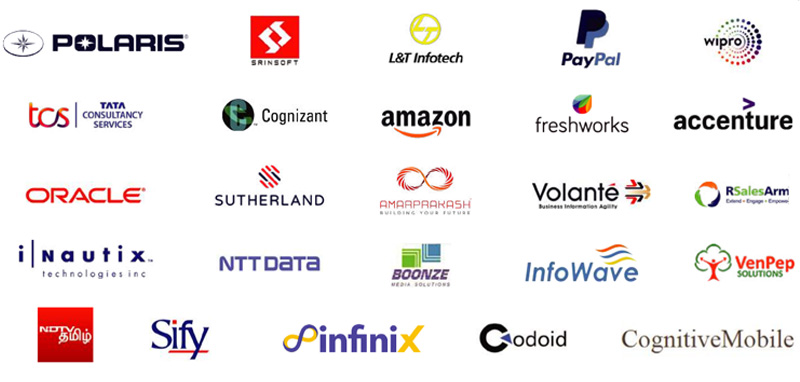
Frequently Asked Question (FAQ) about Software Testing Course in Chennai
- We offer a software testing course developed by software testing professionals with extensive experience in the field.
- Our software testing course in Chennai fees are made affordable, keeping in mind both students and working professionals.
- Course timings are designed to suit working professionals and students.
- We provide Interview Tips and Corporate Training.
- Placement training and resume-building guidance are provided.
- FITA Academy has tie-ups with over 3,000 small, medium, and large-scale companies. These companies seek and also have openings for various job titles, including Selenium Tester, Manual Tester, and other core roles in software testing.
- There is a dedicated placement officer who provides placement assistance to students.
- The Placement cell also assists students in Interview Practice sessions, Software Testing Interview Questions and Answers, and offers group discussion training to help them prepare for interviews.
You can register with us by calling our support number 93450 45466, or you can directly visit our branch nearest you if you are searching for the course for Software Testing near me.
Yes, we have a FITA Academy branch in Chennai, Coimbatore, Madurai, and Bangalore. Although we offer live, instructor-led online sessions, we also cover other major cities. The Software Testing Course Syllabus and teaching methodology are standardized across all our branches in Chennai. However, the batch timings may vary depending on the type of students who present themselves.
- FITA Academy was created in 2012 by IT professionals to offer IT training. Our trainers have over years of experience in this field.
- We have trained more than 1,00,000 students so far, which includes numerous working professionals as well.
- Many industry case studies and real-time projects are provided for the practical training of students at FITA Academy.
- We provide maximum individual attention to the students. The Training batch size is optimized for 5-6 members per batch, providing personal attention and clarity on complex topics with instructors.
Our trainers have years of experience in software testing. Additionally, the training faculty at FITA Academy provides hands-on training to students and working professionals.
We accept all major payment modes, including cards, bank transfers, and UPI, for your convenience.
- Software Testing Training in Velachery
- Software Testing Training in Tambaram
- Software Testing Training in Anna Nagar
- Software Testing Training in Porur
- Software Testing Training in T Nagar
- Software Testing Training in OMR
- Software Testing Training in Adyar
Yes, FITA Academy offers hands-on Selenium training, incorporating real-time project experience to enhance your learning. This ensures that you improve your comprehension of practical, real-life applications, making us one of the top 10 software testing training institutes in Chennai.
General Q & A about Software Testing Course in Chennai
What are software testing fees?
Which is the Best Software Testing Institute in Chennai?
How many months is the software testing course?
Is the testing job easy?
Can I learn testing in 2 months?
Do we have a future in testing?
Does the tester require coding?
Which language is best for software testers?
Can a non-IT person learn testing?
What skills do software testers need?
- Communication skills.
- Analytical and logical mindset.
- Project Management skills.
- Ability to follow procedures.
- Interpersonal skills.
- Attention to detail.
- Eagerness to learn.
- Excellent time management and prioritisation.
- Out of the box thinking
- Business Mindedness
- Adaptability
- Programming Languages
- Preparing software tests
- Understanding of testing tools
- Agile working methodologies
Is HTML required for software testing?
Is manual testing job easy?
Is Python required for software testing?
Can a tester get a high salary?
What is the salary of the manual tester at TCS?
